bank transfers are the go-to way to pay when people in South Africa bet online. They handle almost half of all the money moves in the legal betting sites, about 47.1%. Folks there stick with bank transfers because the money gets where it’s going safely and without any drama.
South Africa’s big banks—FNB, ABSA, Standard Bank, and Nedbank—let you use EFT for gambling stuff. It usually takes 48 to 72 hours to go through, and you get higher limits plus better security. If you’re cashing out, local withdrawals can take up to three workdays, and international ones might need five.
This guide lists the five best gambling sites in South Africa that let you pay straight from your bank account. I’ll cover what makes each site cool, how they keep your money safe, and the exact steps for moving cash in and out. You’ll also see the basics of betting with bank transfers, like the lowest deposit you can make (just R50) and the biggest limits for the big spenders.
Top Bank Transfer Voucher Betting & Casino Sites in South Africa
| Operator | Bonus | Features | Claim Now |
|---|---|---|---|
|
125% Match
Up to R3750 + 25 Free Spins |
|
|
|
|
200% Match
|
|
|
|
|
100% Match
Up to R3000 |
|
|
|
|
100% BONUS
UP TO 100 USD |
|
|
|
|
100% Match
Up to R1000 |
|
|
|
|
100% Match
Up to R4000 |
|
|
|
|
R25 Sign Up Bonus
|
|
|
|
|
100% Match
|
|
|
|
|
500% Match
Up to 2800 USD |
|
|
|
|
100% WELCOME BONUS
UP TO 100 EUR |
|
|
How Bank Transfers Work for SA Online Gambling
Money transfers give South African online gamblers a bunch of cool options. Unlike places where banks are super strict, South African players can grab easy financial services for online betting. They move their money around without any hassle, pretty much every day.
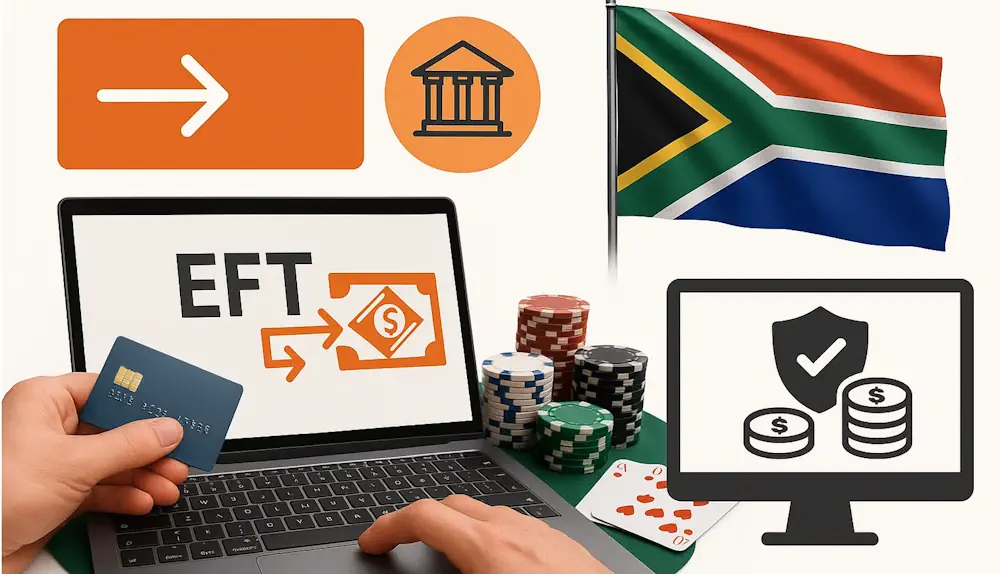
EFT vs. Traditional Wire Transfers
So, if you're gambling in South Africa, you've got two main ways to move your money: Electronic Fund Transfers (EFTs) or the old-school wire transfers. Both work fine, but they each come with their own perks and downsides.
Most South African bettors like using EFTs to load cash into their betting accounts. The money usually lands in the casino’s account within two to three days, depending on what the bank and the betting site say. With an EFT, you just send the funds straight from your bank—no credit cards or extra apps needed.
Old-school wire transfers still run on the banking systems that have been around forever. They can send money between totally different banks or just shuffle it around inside the same one. Either way, your cash ends up at the casino, but the two options aren’t exactly the same.
| Feature | EFT | Traditional Wire Transfer |
|---|---|---|
| Processing Speed | 1-3 business days | 3-5 business days |
| Security Level | Bank-level encryption | Standard bank security |
| Accessibility | Mobile-friendly | Branch or online banking |
| Cost Structure | Generally lower fees | Higher transfer fees |
| SA Bank Compatibility | All major SA banks supported | Limited international support |
Some South African betting sites now let you pay straight from your bank using Ozow or SID Secure EFT. You can move money in real time without bouncing off the casino page. They use the same kind of encryption banks use, so your cash stays safe.
South African Banking Protocols
South African banks have to stick to certain rules when it comes to online gambling transactions. These rules are based on anti-money laundering laws and the stuff banks have to do to stay compliant.
So, FICA (that’s the Financial Intelligence Center Act from 2001) basically says every place that has a gambling or betting license is an “accountable institution.” Because of that, they have to stick to some pretty tight reporting rules. South Africa also runs a risk-based system for anti-money-laundering stuff, and that system decides how people can use bank transfers when they bet online.
South African gamblers have a bunch of ways to pay. Licensed sites can accept money through tons of different options, like straight-up bank transfers. That’s why bank transfers usually work on almost every SA gambling site.
South African banks stick to the usual online payment setup, but they’ve added extra security. You get a one-time password texted to your phone, and you need that code to finish the transfer. That little step makes moving money to gambling sites way safer.
The Financial Sector Conduct Authority (FSCA) oversees these protocols and follows guidelines from:
- Financial Action Task Force (FATF)
- Office of Foreign Assets Control (OFAC)
- Eastern and Southern Africa Anti-Money Laundering Group (ESAAMLG)
This tough rule keeps bank-transfer gambling sites in South Africa both safe and legit. Players who care about staying protected totally win from this setup.
Transaction Verification Requirements
South African betting sites have to make sure they know who their customers are by running something called KYC checks, which follow the FICA rules. These checks help stop dirty money, funding for bad stuff, and people stealing identities, while also keeping players safe.
Betting companies have to finish checking who you are before they let you put any money into your account. This rule is way stricter than what most other countries do.
The verification process has three main steps:
- Customer Identification
- We just need to make sure you’re really you, so we’ll ask for a government ID that shows your name, birthday, and where you live.
- Customer Screening
Players need these items to open an account:
- A government photo ID, like your Smart ID card or passport
- Recent proof of where you live, like a utility bill from the last three months
- Bank statements or other money-related papers
Online gambling needs extra checks since face-to-face verification isn't possible. Operators must:
- Get someone outside your group to back up the in-person checks
- Only take money that comes from bank accounts with the person’s real name on them.
- Mail the verification letters using registered mail so you know they got there.
- Make sure the person’s info matches what’s in the trusted databases.
The Financial Intelligence Center (FIC) says just showing an ID copy isn't enough for verification. Sites need more steps to stay compliant.
Cashing out is a big deal too. Pretty much every site makes you jump through a couple extra hoops before they send your money, like uploading a bill to prove where you live and giving them your bank info. Yeah, it slows things down a bit, but it keeps scammers away from South Africa’s online gambling scene.
Operators have to hang on to all the verification docs and transaction records for five whole years. That way there’s a clear paper trail for security and to stay on the right side of the rules. Knowing this stuff helps players get their deposits and withdrawals processed faster at bank transfer gambling sites.
Top 5 Bank Transfer Gambling Sites in South Africa
South African players care more about trust than how easy it is to sign up or how flashy the site looks. The top bank transfer casinos in South Africa give you solid security, fast payouts, and helpful support all in one package. These five casinos are the best at handling bank transfers.
Springbok Casino: South Africa's Premier EFT Option

Springbok Casino is basically the main spot for Electronic Fund Transfers when it comes to online gambling in South Africa. Gamers can pick between two EFT choices that were built for South Africans: EasyEFT and SID, which stands for Secure Instant Deposit.
Springbok is cool because you only need R25 to start an EasyEFT deposit. That’s super low, so it works for anyone just messing around or totally new to this. Everything’s in South African Rand, so you won’t get hit with extra charges for swapping money.
The casino's EFT system gives players some great security benefits:
- Your cash just hangs out inside your bank’s own security setup.
- You don’t have to sign up for any other services.
- Your money stays right in the regular bank system.
- Your money lands in your casino account instantly.
The banking team on the platform puts it like this: "EasyEFT is just an online way to move money safely. It pulls cash straight from your bank account and drops it into the casino’s account, or the other way around if you’re cashing out." Because it’s so straightforward, Springbok has become the go-to spot for South African players who want quick bank transfers.
Silversands Casino: Banking Security Features
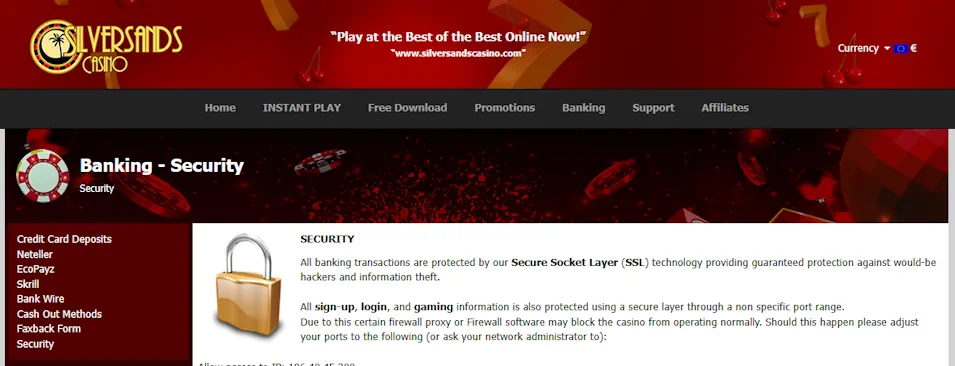
When you're choosing a gambling site that uses bank transfers, security has to come first. Silversands Casino nails it by stacking up several layers of protection every time you move money.
The casino keeps all money stuff safe with solid SSL tech. That covers deposits, withdrawals, sign-ups, logins, and even your gaming data, all flowing through different ports.
The casino also uses strong security measures like:
- It uses 128-bit SSL encryption to keep your personal info safe.
- Getting PCI DSS certified so we can shut down fraud
- Two-step login with a text message
Silversands might ask for more paperwork before they send out your money. Their security rules say: "For extra safety, Silver Sands can ask players to fill out a fax-back form and send it to the number on the sheet before any payouts go through."
The casino is super careful with your private info. When they need to check your credit card, they only ask for the first four and last four numbers, the name printed on the card, and the signature on the back.
Yebo Casino: Deposit and Withdrawal Limits
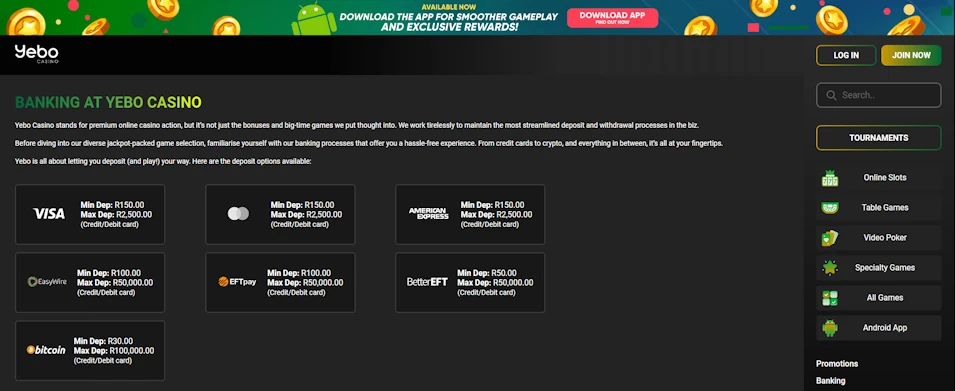
Yebo Casino is cool for both chill players and the hardcore ones because the limits on deposits and withdrawals are pretty fair. You always know what’s up since the rules are super clear.
You can jump in with only R50 for your first deposit, so new players can test the waters without blowing a ton of cash. When you’re ready to cash out, the minimum is R600, which keeps the payouts running smoothly.
High rollers are into Yebo’s R50,000 max cash-out. It’s a sweet spot: big enough for those monster wins, but chill enough that South African banks don’t freak out.
Players can use several bank transfer options:
- EFT (Electronic Fund Transfer)
- SID Instant EFT
- Ozow
- Standard bank transfers
Most cash-outs take around three days. Yebo also handles withdrawals on weekends, which a lot of other South African betting sites skip. That’s super handy if you’re trying to pull your money on a Friday.
Thunderbolt Casino: Processing Times
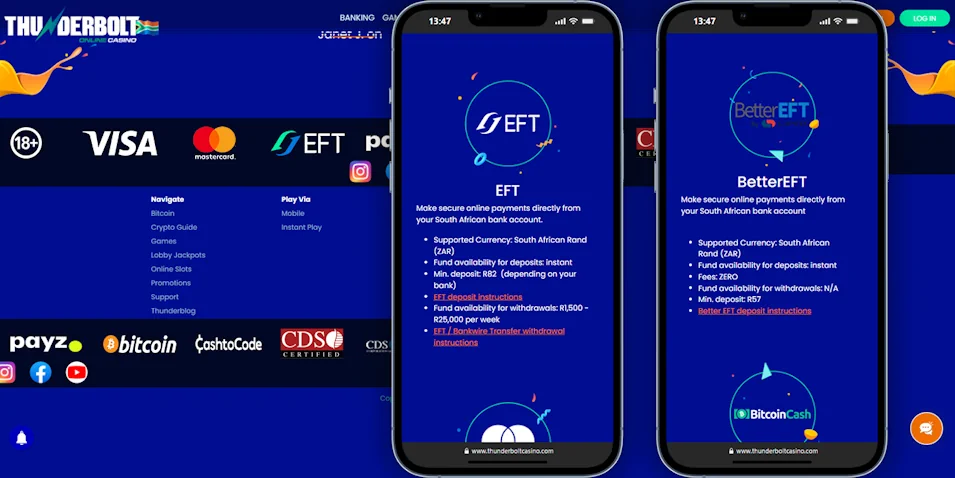
Thunderbolt Casino actually tells you the exact time your money will show up. They give you the exact hour instead of just saying “soon,” so you can plan your day without guessing.
Their rules are pretty clear: “We’ll send your withdrawal to the processing team within 48 hours (that’s two business days), and then they’ll finish everything up after that.” So it’s a two-step thing: first they check it, then they actually send the money.
They keep it super clear with an example: if you ask to cash out on Monday at 10 AM, the request hits the processing team by Wednesday at 10 AM. That way players know exactly when their money’s coming.
The casino lets you cash out anywhere from R1,500 to R25,000 every week through EFT. Your deposits hit your account instantly, so you can jump straight into the games.
Players can use different EFT options based on their bank:
- BetterEFT works really well with Capitec
This variety means you can use the casino whatever bank you prefer.
Punt Casino: Customer Support for Banking Issues
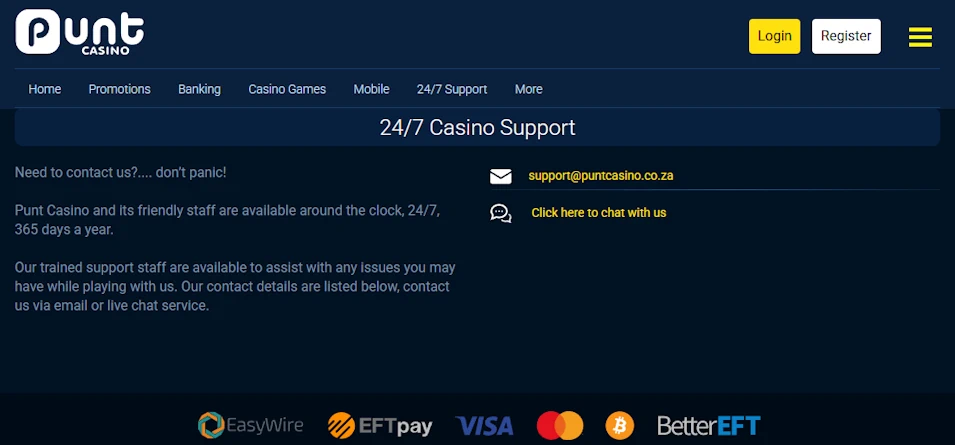
Sometimes your deposit or withdrawal just doesn’t go through, and that’s when Punt Casino’s support crew has your back. They’re online 24/7, every single day, ready to answer any banking questions you’ve got.
You can reach them through:
- Quick help chat
- A super clear FAQ that covers the stuff people usually mess up
They send out the money on Mondays, Wednesdays, and Fridays. Most of the time you’ll see the cash in your account within three business days, which is pretty much the same as other casinos in South Africa.
Every time you take money out, it’s gonna cost you R100. Yeah, fees are annoying, but at least they tell you before you hit “confirm.” You can pull out anywhere from R600 to R50,000 in one go. When you’re putting money in, you’ve got three choices: BetterEFT, EFTPay, or EasyWire—just pick whichever feels easiest.
The casino makes sure their crew really knows what they’re doing: “Our trained support staff are ready to help with any problems you run into while playing.” So even if you hit a weird banking snag, you’ll still get solid help.
Security Features of Bank Transfer Gambling Sites

Security is basically the whole deal for trusted bank transfer gambling sites in South Africa. These sites rely on some pretty advanced protection tricks to keep players’ personal and money info locked down. Online gambling in South Africa runs into its own set of security headaches, so the sites have to use special rules that go way past the usual digital safety stuff.
SSL Encryption Standards
South African gambling sites that handle bank transfers use some pretty solid encryption tech to keep everything safe. They rely on SSL and TLS protocols to make sure no one can sneak a peek at your private info.
South African gambling sites use either 128-bit or 256-bit encryption. The 256-bit option is stronger and gives the same level of protection that big banks around the world use. This encryption turns your private info into a scrambled code while it’s being sent, so no one can read it.
You can spot a secure gambling site by looking for these markers:
- Make sure the web address starts with HTTPS, not just plain old HTTP.
- You’ll see a little padlock icon hanging out in the browser’s address bar.
- You can check if a site’s SSL certificate is legit by clicking the little padlock in the address bar.
- Some browsers show a green address bar when a site has an extended validation certificate.
This protection isn’t just about locking down your transactions. Security pros in the online gambling world say: “Every time you log in, drop some cash, or place a bet, your moves are guarded by tricky algorithms that keep your info safe from outside threats.”
South African players should take a quick look at the SSL setup before they join any site. When the security certificates are out of date, they leave holes that can expose your info. Casino sites have to renew these digital certificates every year or two so the protection stays solid.
FICA Compliance Requirements
South African gambling places have to stick to some pretty tight rules because of something called the Financial Intelligence Center Act, or FICA for short. This 20-year-old law is meant to stop people from cleaning dirty money and to cut off cash that could fund terrorism. In Schedule 1 of the FIC Act, bookmakers and totalisators are called "accountable institutions," so they have to follow all the compliance rules.
The Financial Intelligence Center (FIC) basically tells everyone how to stick to the rules, and if you don’t, you can get hit with fines. So, online gambling sites have to follow the exact FICA steps the FIC lays out:
- Signing Up with the Financial Intelligence Center
- Rolling out a security plan that focuses on the biggest risks first
- Setting Up a Risk Management and Compliance Program (RMCP)
- Setting up ways to check who really owns a company
- Keeping an eye on transactions all the time and hanging on to the records
Record-keeping rules are super important. Gambling sites have to save all the details about their users, every single transaction, and any reports they send to regulators. They need to keep all that stuff for at least five years starting from:
- When the business partnership ends
- When the deal is officially done
- The deadline for turning in the reports to the FIC
Gambling companies have to bring on compliance officers who actually know their stuff and have enough clout to get things done. These officers set up regular training sessions for the staff so everyone stays up to speed on FICA rules and the company’s own compliance game plan.
Identity Verification Processes
South African bank transfer gambling sites have some of the toughest ID checks you’ll find anywhere in the world. Section 21 of the FIC Act basically says that banks and other accountable places can’t open an account or handle any transactions until they’ve checked who their customer really is.
These platforms use three main verification components:
Initial Verification Checks:
- Checking who you are with your official ID
- Checking ages to stop kids from gambling
- Checking if someone is a Politically Exposed Person (PEP)
Digital Footprint Analysis:
- Checking out IP addresses to see if they’re coming from a proxy or VPN
- Checking if an email address is legit and looking into its past
- Using device fingerprinting to spot weird patterns
Continuous Monitoring:
- We just need to double-check the high-risk accounts every now and then.
- Keeping an eye on the lists of people who are officially sanctioned
When you’re standing right in front of someone, a quick ID check is usually enough. But when it’s online gambling, you’ve got to do more to prove who you are since nobody’s actually meeting face-to-face. The FIC makes it clear that just sending over a copy of your ID, even if it’s certified, doesn’t cut it for proving your identity.
South African players need to provide:
- Just bring a color copy of any ID that’s still good to go—like your school smart card, driver’s license, or passport.
- Show a recent utility bill (like water, gas, or electric) from the last three months that has your home address on it.
- South African bank statements or any paper that shows you’ve got an account there
Digital identity platforms make these checks way faster. They run automated systems that can ping tons of identity sources—like biometrics or lists of risky people—and spit out a way better verification in no time.
The rule in the industry is pretty straightforward: if a customer hasn’t finished the ID check and verification, their betting account can’t take any money. This stops money laundering and keeps regular players safe.
A lot of South African betting sites now use something called two-factor authentication, or 2FA for short. Basically, you have to show who you are in two different ways before you can get into your account—most of the time that means typing your password and then typing a code that gets sent to your phone.
This combo of security stuff—encryption, following the rules, and checking who you are—builds a solid wall that keeps both players and operators safe in South Africa’s bank-transfer gambling scene. Sure, these steps can make things take a bit longer, but they’re the key defense against the rising dangers in online gambling.
Advantages and Limitations of Bank Transfers for Betting
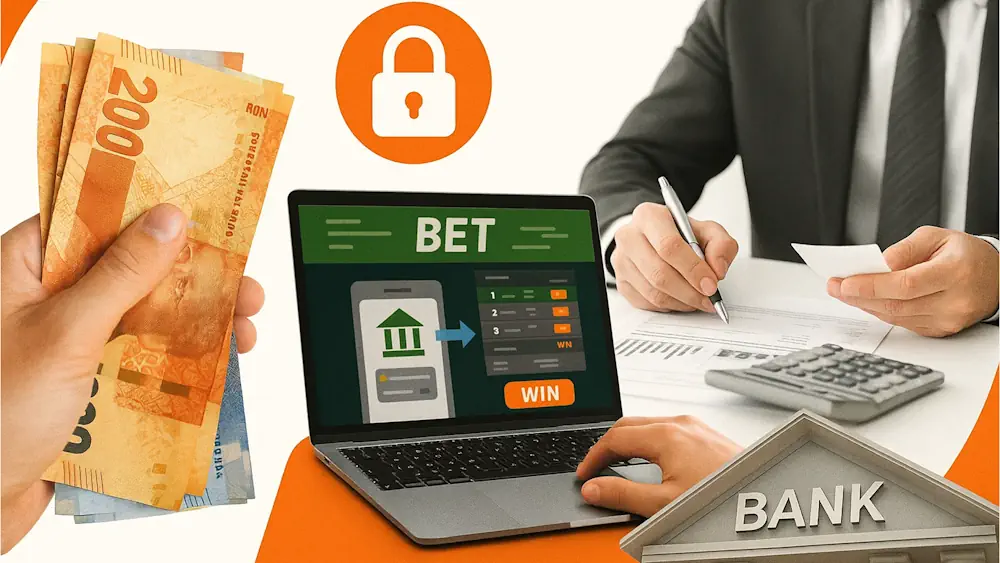
When you’re deciding how to pay for online gambling, you’ve got to weigh the good and bad sides of bank transfers. South African bettors need to understand what actually happens with their money before they choose this option at online casinos.
Higher Transaction Limits for High Rollers
Bank transfers are the go-to because they let you move way more cash, which is great for South African players who like to bet big. E-wallets and prepaid vouchers cap you pretty low, but with bank transfers you can shift way larger sums between you and the gambling sites.
This is a pretty big deal for people who take gambling seriously. High rollers, the ones who drop huge bets all the time, need banking options that keep up with their style. Most top casinos expect these big spenders to show up with somewhere between ZAR 900,027 and ZAR 1,350,040 just to get in the game.
Bank transfers let you move much more money than other options:
| Payment Method | Typical Maximum Transaction Limit |
|---|---|
| Bank Transfer | ZAR 900,027+ |
| E-Wallets | Few thousand ZAR |
| Credit Cards | ZAR 25,000-50,000 |
| Prepaid Vouchers | ZAR 5,000-10,000 |
When someone hits a huge jackpot, they need those bigger limits so they can actually cash out. It’s true that bank wires let gamblers move way more money than any other option out there.
If you're a VIP at South African casinos, the cash-out rules are way nicer. The highest-level players can pull out up to 50,000 rand at once. Because of that, bank transfers are basically the go-to move for big spenders in South Africa's online gambling scene.
Security Benefits
South African gamblers are into bank transfers because they feel safe. The transfers give you solid safety and security by linking your bank right to the gambling site.
The strong security system has several layers:
- Bank-level encryption keeps all your transaction data safe
- Just double-check with a text or your banking app before you move on.
- You’ll get a heads-up the second something goes on with your account.
- You can get your money back if something messes up.
This setup basically means it’s super hard for anyone else to mess with your casino deposit or withdrawal. Bank transfers keep you safer than most other ways to pay, since South African banks have really strict security rules.
Bank transfers skip the extra steps, so they’re way safer. Every time you move money, the bank runs its own security checks, which is why people say it’s “super safe online payments for gamblers.”
Processing Time Considerations
The downside of all this extra security is that everything takes longer. Experts say that’s the biggest problem with the method, since these transfers are way slower than other payment options.
Regular bank transfers to South African gambling sites usually take:
- Deposits usually take about 1 to 3 days before they show up in your account.
- Withdrawals: Takes about 3 to 5 school days if you're in South Africa.
- International withdrawals: can take up to 7 business days
Compare that to e-wallets or crypto, which finish up in minutes or even seconds. The hold-up is just all the security checks and anti-fraud stuff banks have to run.
Time isn’t just about the basic computer stuff. If you move money on a weekend or holiday, it’s gonna take even longer. Sometimes, if they need to double-check things, you could be waiting up to 21 days before the withdrawal shows up.
Fee Structures Across Different Banks
When you use a bank transfer to put money into an online gambling site, you’ve got to watch out for fees. Most banks in South Africa will charge you something, and the exact amount changes from bank to bank.
Here's what major South African banks charge:
- Standard Bank charges R2.65 for every R100 you take out in cash if you’re on one of their bundled accounts.
- ABSA charges R10 for every R1,000 you take out at their ATMs.
- Nedbank charges R10 for every R1,000 you take out at an ATM.
- Capitec charges R9.50 for every R1,000 you take out at an ATM.
Online casinos usually tack on extra charges for bank transfers. They might be a set amount or a slice of the total. Those “sizeable cost and fees” can stack up every time you put money in or take it out.
When you send money overseas, the fees can really add up because you also get hit with currency conversion charges. If you're just moving a small amount for fun, those extra costs can wipe out a big chunk of your cash, so using a bank transfer usually isn't the smartest move.
So basically, bank transfers are the go-to for players who need to move big stacks of cash because they’re super secure and let you send way more at once. If you’re just playing for fun, though, you’ll probably like the quicker, cheaper options floating around South Africa’s online casinos.
Step-by-Step Guide to Using Bank Transfers
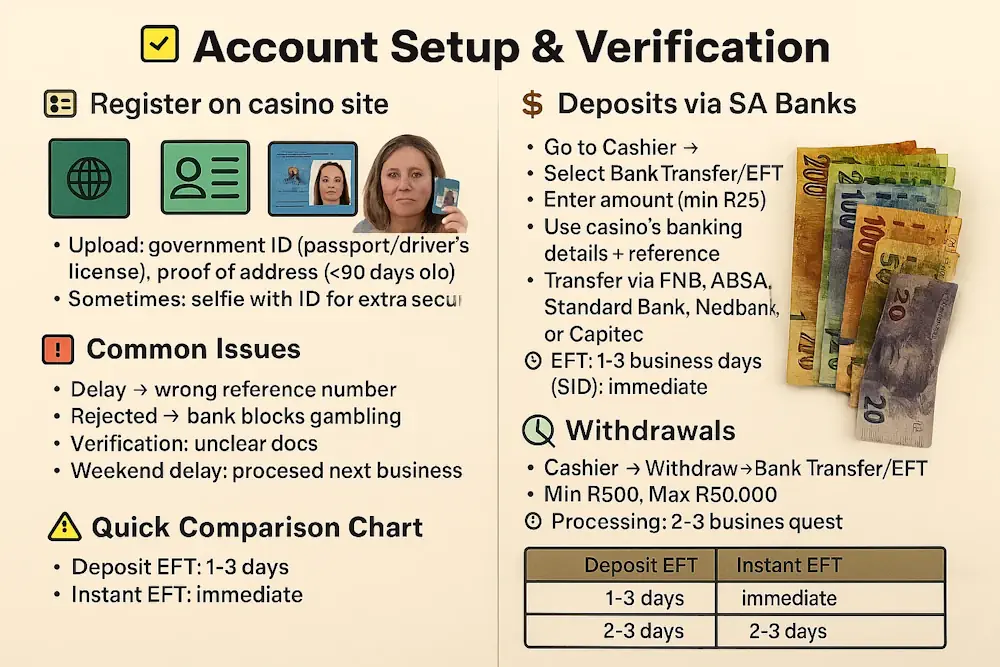
Setting up your account and cashing out with a bank transfer on a South African betting site is pretty straightforward. If you know what’s coming at each stage, your money moves without any drama.
Setting Up Your Casino Account
You gotta finish the whole sign-up thing before you can move any money around. Just hop onto the casino site you picked and fill out the basic info they ask for. The best bank-transfer casinos usually want:
- Just bring a real photo ID that the government gives out, like your passport or driver's license.
- A bill or letter that shows where you live and is no older than 90 days
- Color copies of the front and back of the document
Some sites, like Springbok Casino, will ask for a selfie where you’re holding your driver’s license or other government ID right next to your face if you’re mixing crypto with regular bank transfers. Getting this done early keeps your cash-out from getting stuck later.
Initiating Deposits from Major SA Banks
Your account verification opens the door to deposits through South African banks with this standard procedure:
- Log into your casino account and go to the Cashier/Payment section
- Select "Bank Transfer" or "EFT" from available payment options
- Enter your desired deposit amount (minimum deposits typically start at R25)
- Note the casino's banking details and reference number provided
- Log into your online banking portal (FNB, ABSA, Standard Bank, Nedbank, Capitec, etc.)
- Start the transfer using the exact details and reference provided
- Confirm the transaction through your bank's verification method
Putting the reference number in exactly like they gave it keeps your stuff from getting stuck in processing. EFT deposits usually show up in your account within one to three days. Instant EFT services like SiD let you drop money into lots of South African betting sites right away.
Withdrawal Procedures and Verification
Withdrawals need extra security measures. Complete all verification requirements first:
- Visit the cashier section and select "Withdraw"
- Choose Bank Transfer/EFT as your withdrawal method
- Enter the amount (typically minimum R500, maximum R50,000)
- Check your banking details for accuracy
- Submit your request
EFT withdrawals usually take about 2 to 3 business days to go through. Just remember that the casino only handles withdrawals on weekdays, so Springbok Casino works on them from Monday to Friday.
Troubleshooting Common Issues
Bank transfer challenges you might face:
- Delayed Deposits: Check your reference number's accuracy and contact support if your deposit hasn't shown after 3 business days
- Rejected Transactions: Your bank might block gambling transactions or you might have insufficient funds
- Verification Problems: Rejected documents need clear, colored copies with visible corners
- Weekend Delays: Friday evening transactions process on the next business day
If something keeps going wrong, just hit up your casino’s support crew. Have your transaction numbers and any proof from your bank ready so they can sort it out fast.
Our verdict
Bank transfers are still the go-to way to pay at South African online casinos because they feel super safe and let you move big amounts. Sites like Springbok Casino and Silversands have their own EFT setups. You can deposit anywhere from R25 up to R50,000, so whether you’re just playing for fun or going all in, you’re covered.
Keeping your cash safe is the top priority. Every legit betting site uses SSL encryption and sticks to the FICA rules. Local payouts usually land in 48 to 72 hours, but that little wait is just to make sure your money stays locked down.
Bank transfer gambling sites are actually legit—almost half (47.1%) of all regulated market transactions go through them. The big South African banks—Standard Bank, ABSA, Nedbank, and FNB—are totally on board. Fees are pretty chill too: you’re looking at R2.65 to R10 for every R1,000 you move, depending on which bank you use.
Just so you know, the verification rules are there to keep you safe. Before you move any big money around, your paperwork has to hit the mark. Most sites will ask for your official ID and a bill or something that proves where you live, as long as it’s from the last three months.
Go for a gambling site that lets you pay by bank transfer and actually fits the games you like and the safety level you want. Just check the smallest amount you can deposit, how much you can cash out, and how long everything takes before you lock in your pick.










